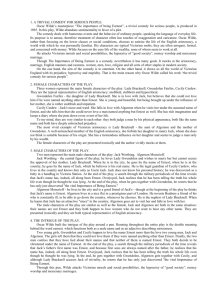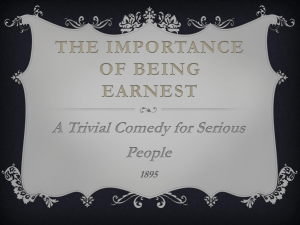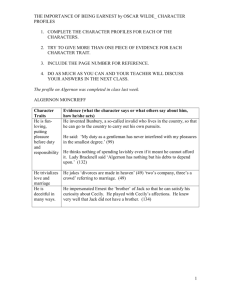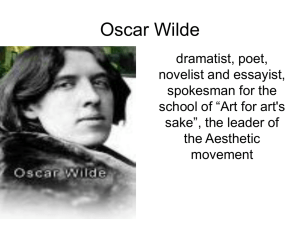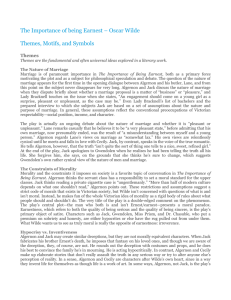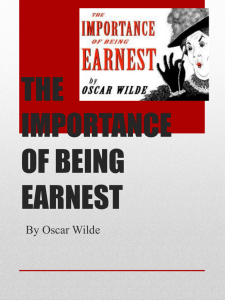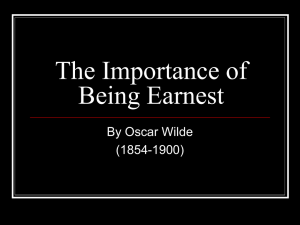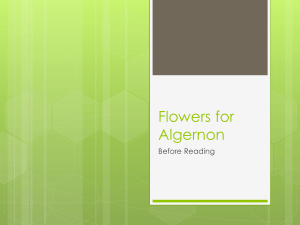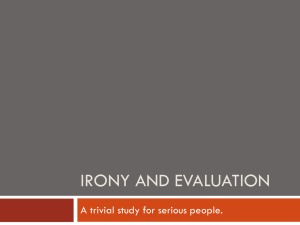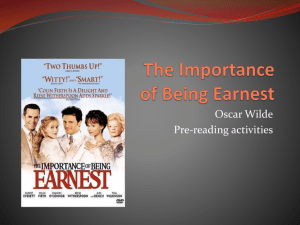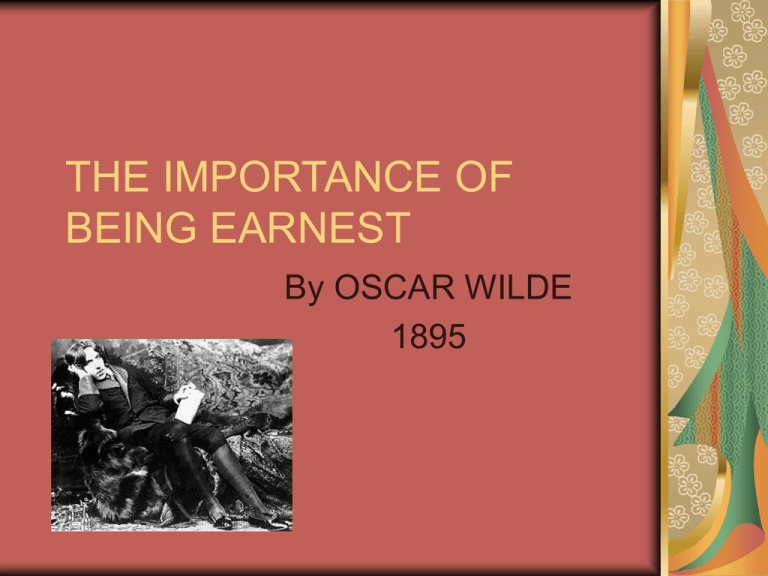
THE IMPORTANCE OF
BEING EARNEST
By OSCAR WILDE
1895
Key Facts
full title · The Importance of Being Earnest: A Trivial
Comedy for Serious People
type of work · Play
genre · Social comedy; comedy of manners; satire;
intellectual farce
time and place written · Summer 1894 in Worthing,
England
date of first production · February 14, 1895. In part
because of Wilde’s disgrace, the play was not published until
1899.
publisher · L. Smithers
tone · Light, scintillating, effervescent, deceptively flippant
setting (time) · 1890s
setting (place) · London (Act I) and Hertfordshire, a rural
county not far from London (Acts II and III)
SUMMARY
protagonist · John Worthing, known as “Ernest” by his friends in
town (i.e., London) and as “Jack” by his friends and relations in the
country
major conflict · Jack faces many obstacles to his romantic union
with Gwendolen. One obstacle is presented by Lady Bracknell
(Gwendolen’s Mother), who objects to what she refers to as Jack’s
“origins” (i.e. his inability to define his family background). Another
obstacle is Gwendolen’s obsession with the name “Ernest,” since
she does not know Jack’s real name.
rising action · Algernon ( Jack’s friend in town) discovers that Jack
is leading a double life and that he has a pretty young ward named
Cecily. The revelation of Jack’s origins causes Lady Bracknell to
forbid his union with Gwendolen. Identifying himself as “Ernest,”
Algernon visits Jack’s house in the country and falls in love with
Cecily.
climax · Gwendolen and Cecily discover that both Jack and
Algernon have been lying to them and that neither is really named
“Ernest.”
falling action · Miss Prism is revealed to be the governess who
mistakenly abandoned Jack as a baby and Jack is discovered to be
Algernon’s elder brother, and is in actual fact named Earnest.
THEMES, MOTIFS & SYMBOLS
themes ·Victorian Social Issues. The
nature of marriage; the constraints of
morality; hypocrisy vs. inventiveness;
the importance of not being “earnest”.
motifs · Puns; inversion; death; the
dandy
symbols · The double life; food;
fiction and writing
LANGUAGE & STRUCTURAL
DEVICES
Language style ~ "The major influence on Wilde and his writing
style was not that of his contemporaries, George
Bernard Shaw being one, but rather the inheritance of Restoration
Comedy. . . It has been argued that Wilde's plays are not so much
about people as about words. The characters live through their
speech, merely conveying the role they are playing, rather than
their psychology."
The play is structured as a series of verbal fencing matches in
which showing the right form is as important as making one's point.
foreshadowing · In stage comedy and domestic melodrama,
foreshadowing often takes the form of objects, ideas, or plot points
whose very existence in the play signal to the audience that they
will come up again.
Structure of play ~ Influenced by French Theatre, Melodrama,
Social drama & Farce
LANGUAGE & STRUCTURAL
DEVICES cont
FARCE ~ Broadly humorous play based on the exploitation of
improbable or ludicrous situations.
Humorous play using exaggerated physical action, slapstick,
absurdity & improbability.
Contains surprises where the unexpected is disclosed: Jack
misidentifies Prism as his unmarried mother – typical farcical ending.
Farces ~ 3 Acts
Changes in identity
Stock Characters
Misunderstandings between lovers
Mourning clothes & gobbling food down at times of stress are
conventions used in early farces.
LANGUAGE & STRUCTURAL
DEVICES cont:
Marriage plots / Social comedies typical of 1890’s literature
Many comedies of the time were Social comedies, plays set in
contemporary times discussing current problems.
White Anglo Saxon male society of the time provided many targets
of complacency & aristocratic attitudes that playwrights, such as
Wilde, could attack.
THEMES AND
EXPLEMPLIFICATION FROM THE
TEXT.
Themes are the fundamental and often universal ideas
explored in a literary work.
Victorian Social issues:MARRIAGE
is of paramount importance in The Importance of Being Earnest, both
as a primary force motivating the plot and as a subject for philosophical
speculation and debate. The question of the nature of marriage
appears for the first time in the opening dialogue between Algernon and
his butler, Lane, and from this point on the subject never disappears for
very long. Algernon and Jack discuss the nature of marriage when they
dispute briefly about whether a marriage proposal is a matter of
“business” or “pleasure,” and Lady Bracknell touches on the issue
when she states, “An engagement should come on a young girl as a
surprise, pleasant or unpleasant, as the case may be.” Even Lady
Bracknell's list of bachelors and the prepared interview to which she
subjects Jack are based on a set of assumptions about the nature and
purpose of marriage. In general, these assumptions reflect the
conventional preoccupations of Victorian respectability—social position,
income, and character.
THEMES AND
EXPLEMPLIFICATION FROM THE
TEXT
MARRIAGE – cont The play is actually an ongoing debate about the
nature of marriage and whether it is “pleasant or unpleasant.” Lane
remarks casually that he believes it to be “a very pleasant state,”
before admitting that his own marriage, now presumably ended, was
the result of “a misunderstanding between myself and a young
person.” Algernon regards Lane's views on marriage as “somewhat
lax.” His own views are relentlessly cynical until he meets and falls in
love with Cecily. Jack, by contrast, speaks in the voice of the true
romantic. He tells Algernon, however, that the truth “isn't quite the sort
of thing one tells to a nice, sweet, refined girl.” At the end of the play,
Jack apologizes to Gwendolen when he realizes he had been telling
the truth all his life. She forgives him, she says, on the grounds that
she thinks he's sure to change, which suggests Gwendolen's own
rather cynical view of the nature of men and marriage.
THEMES AND
EXPLEMPLIFICATION FROM THE
TEXT cont
The Constraints of Morality
Morality and the constraints it imposes on society is a favorite topic of
conversation in The Importance of Being Earnest. Algernon thinks the
servant class has a responsibility to set a moral standard for the upper
classes. Jack thinks reading a private cigarette case is “ungentlemanly.”
“More than half of modern culture depends on what one shouldn't read,”
Algernon points out. These restrictions and assumptions suggest a strict
code of morals that exists in Victorian society, but Wilde isn't concerned with
questions of what is and isn't moral. Instead, he makes fun of the whole
Victorian idea of morality as a rigid body of rules about what people should
and shouldn't do. The very title of the play is a double-edged comment on
the phenomenon. The play's central plot—the man who both is and isn't
Ernest/earnest—presents a moral paradox. Earnestness, which refers to
both the quality of being serious and the quality of being sincere, is the
play's primary object of satire. Characters such as Jack, Gwendolen, Miss
Prism, and Dr. Chasuble, who put a premium on sobriety and honesty, are
either hypocrites or else have the rug pulled out from under them. What
Wilde wants us to see as truly moral is really the opposite of earnestness:
irreverence
THEMES AND
EXPLEMPLIFICATION FROM THE
TEXT cont
Hypocrisy vs. Inventiveness
Algernon and Jack may create similar deceptions, but they are not
morally equivalent characters. When Jack fabricates his brother
Ernest's death, he imposes that fantasy on his loved ones, and
though we are aware of the deception, they, of course, are not. He
rounds out the deception with costumes and props, and he does his
best to convince the family he's in mourning. He is acting
hypocritically. In contrast, Algernon and Cecily make up elaborate
stories that don't really assault the truth in any serious way or try to
alter anyone else's perception of reality. In a sense, Algernon and
Cecily are characters after Wilde's own heart, since in a way they
invent life for themselves as though life is a work of art. In some
ways, Algernon, not Jack, is the play's real hero. Not only is
Algernon like Wilde in his dandified, exquisite wit, tastes, and
priorities, but he also resembles Wilde to the extent that his fictions
and inventions resemble those of an artist.
THEMES AND
EXPLEMPLIFICATION FROM THE
TEXT cont
The Importance of Not Being “Ernest”
Earnestness, which implies seriousness or sincerity, is the great enemy of morality in
The Importance of Being Earnest. Earnestness can take many forms, including
boringness, solemnity, pomposity, complacency, smugness, self-righteousness, and
sense of duty, all of which Wilde saw as hallmarks of the Victorian character. When
characters in the play use the word serious, they tend to mean “trivial,” and vice versa.
For example, Algernon thinks it “shallow” for people not to be “serious” about meals,
and Gwendolen believes, “In matters of grave importance, style, not sincerity is the vital
thing.”
For Wilde, the word earnest comprised two different but related ideas: the notion of
false truth and the notion of false morality, or moralism. The moralism of Victorian
society—its smugness and pomposity—impels Algernon and Jack to invent fictitious
alter egos so as to be able to escape the strictures of propriety and decency. However,
what one member of society considers decent or indecent doesn't always reflect what
decency really is. One of the play's paradoxes is the impossibility of actually being
either earnest (meaning “serious” or “sincere”) or moral while claiming to be so. The
characters who embrace triviality and wickedness are the ones who may have the
greatest chance of attaining seriousness and virtue.
MOTIFS – motifs are reoccurring structures, contrasts or
literacy devices that can help to develop and inform the text’s major
themes
Puns
In The Importance of Being Earnest, the pun, widely considered to be the lowest form
of verbal wit, is rarely just a play on words. The pun in the title is a case in point. The
earnest/Ernest joke strikes at the very heart of Victorian notions of respectability and
duty. Gwendolen wants to marry a man called Ernest, and she doesn't care whether the
man actually possesses the qualities that comprise earnestness. She is, after all, quick
to forgive Jack's deception. In embodying a man who is initially neither “earnest” nor
“Ernest,” and who, through forces beyond his control, subsequently becomes both
“earnest” and “Ernest,” Jack is a walking, breathing paradox and a complex symbol of
Victorian hypocrisy.
In Act III, when Lady Bracknell quips that until recently she had no idea there were any
persons “whose origin was a Terminus,” she too is making an extremely complicated
pun. The joke is that a railway station is as far back as Jack can trace his identity and
therefore a railway station actually is his “origin,” hence the pun. In Wilde's day, as in
the England of today, the first stop on a railway line is known as the “origin” and the last
stop as the “terminus.” There's also a whole series of implicit subsidiary puns on words
like line and connection that can refer to either ancestry or travel. Wilde is poking fun at
Lady Bracknell's snobbery. He depicts her as incapable of distinguishing between a
railway line and a family line, social connections and railway connections, a person's
ancestral origins and the place where he chanced to be found. In general, puns add
layers of meaning to the characters' lines and call into question the true or intended
meaning of what is being said.
MOTIFS - cont
Inversion
One of the most common motifs in The Importance of Being
Earnest is the notion of inversion, and inversion takes many forms.
The play contains inversions of thought, situation, and character, as
well as inversions of common notions of morality or philosophical
thought. When Algernon remarks, “Divorces are made in Heaven,”
he inverts the cliché about marriages being “made in heaven.”
Similarly, at the end of the play, when Jack calls it “a terrible thing”
for a man to discover that he's been telling the truth all his life, he
inverts conventional morality. Most of the women in the play
represent an inversion of accepted Victorian practices with regard
to gender roles. Lady Bracknell usurps the role of the father in
interviewing Jack, since typically this was a father's task, and
Gwendolen and Cecily take charge of their own romantic lives,
while the men stand by watching in a relatively passive role. The
trick that Wilde plays on Miss Prism at the end of the play is also a
kind of inversion: The trick projects onto the play's most fervently
moralistic character the image of the “fallen woman” of melodrama.
MOTIFS - cont
Death
Jokes about death appear frequently in The Importance of Being Earnest.
Lady Bracknell comes onstage talking about death, and in one of the play's
many inversions, she says her friend Lady Harbury looks twenty years
younger since the death of her husband. With respect to Bunbury, she
suggests that death is an inconvenience for others—she says Bunbury is
“shilly-shallying” over whether “to live or to die.” On being told in Act III that
Bunbury has died suddenly in accordance with his physicians' predictions,
Lady Bracknell commends Bunbury for acting “under proper medical
advice.” Miss Prism speaks as though death were something from which
one could learn a moral lesson and piously says she hopes Ernest will profit
from having died. Jack and Algernon have several conversations about how
to “kill” Jack's imaginary brother. Besides giving the play a layer of dark
humor, the death jokes also connect to the idea of life being a work of art.
Most of the characters discuss death as something over which a person
actually has control, as though death is a final decision one can make about
how to shape and color one's life.
MOTIFS - cont
The Dandy
To the form of Victorian melodrama, Wilde contributed the figure of the dandy, a character who gave
the form a moral texture it had never before possessed. In Wilde's works, the dandy is a witty,
overdressed, self-styled philosopher who speaks in epigrams and paradoxes and ridicules the cant
and hypocrisy of society's moral arbiters. To a very large extent, this figure was a self-portrait, a standin for Wilde himself. The dandy isn't always a comic figure in Wilde's work. In A Woman of No
Importance and The Picture of Dorian Gray, he takes the form of the villains Lord Illingworth and Lord
Henry Wootton, respectively. But in works such as Lady Windermere's Fan, An Ideal Husband, and
The Importance of Being Earnest, Wilde seems to be evolving a more positive and clearly defined
moral position on the figure of the dandy. The dandy pretends to be all about surface, which makes
him seem trivial, shallow, and ineffectual. Lord Darlington and Lord Goring (in Lady Windermere's Fan
and An Ideal Husband) both present themselves this way. In fact, the dandy in both plays turns out to
be something very close to the real hero. He proves to be deeply moral and essential to the happy
resolution of the plot.
In The Importance of Being Earnest, Algernon has many characteristics of the dandy, but he remains
morally neutral throughout the play. Many other characters also express dandiacal sentiments and
views. Gwendolen and Lady Bracknell are being dandiacal when they assert the importance of
surfaces, style, or “profile,” and even Jack echoes the philosophy of the dandy when he comes
onstage asserting that “pleasure” is the only thing that should “bring one anywhere.” For the most
part, these utterances seem to be part of Wilde's general lampooning of the superficiality of the upper
classes. The point is that it's the wrong sort of superficiality because it doesn't recognize and applaud
its own triviality. In fact, Cecily, with her impatience with self-improvement and conventional morality
and her curiosity about “wickedness,” is arguably the character who, after Algernon, most closely
resembles the dandy. Her dandiacal qualities make her a perfect match for him.
SYMBOLS – are objects, characters figures or
colours used to represent abstract ideas or concepts
The Double Life
The double life is the central metaphor in the play, epitomized in the notion
of “Bunbury” or “Bunburying.” As defined by Algernon, Bunburying is the
practice of creating an elaborate deception that allows one to misbehave
while seeming to uphold the very highest standards of duty and
responsibility. Jack's imaginary, wayward brother Ernest is a device not only
for escaping social and moral obligations but also one that allows Jack to
appear far more moral and responsible than he actually is. Similarly,
Algernon's imaginary invalid friend Bunbury allows Algernon to escape to
the country, where he presumably imposes on people who don't know him in
much the same way he imposes on Cecily in the play, all the while seeming
to demonstrate Christian charity. The practice of visiting the poor and the
sick was a staple activity among the Victorian upper and upper-middle
classes and considered a public duty. The difference between what Jack
does and what Algernon does, however, is that Jack not only pretends to be
something he is not, that is, completely virtuous, but also routinely pretends
to be someone he is not, which is very different. This sort of deception
suggests a far more serious and profound degree of hypocrisy. Through
these various enactments of double lives, Wilde suggests the general
hypocrisy of the Victorian mindset.
SYMBOLS - cont
Food
Food and scenes of eating appear frequently in The Importance of Being
Earnest, and they are almost always sources of conflict. Act I contains the
extended cucumber sandwich joke, in which Algernon, without realizing it,
steadily devours all the sandwiches. In Act II, the climax of Gwendolen and
Cecily's spat over who is really engaged to Ernest Worthing comes when
Gwendolen tells Cecily, who has just offered her sugar and cake, that sugar
is “not fashionable any more” and “Cake is rarely seen at the best houses
nowadays.” Cecily responds by filling Gwendolen's tea with sugar and her
plate with cake. The two women have actually been insulting each other
quite steadily for some time, but Cecily's impudent actions cause
Gwendolen to become even angrier, and she warns Cecily that she “may go
too far.” On one level, the jokes about food provide a sort of low comedy,
the Wildean equivalent of the slammed door or the pratfall. On another
level, food seems to be a stand-in for sex, as when Jack tucks into the
bread and butter with too much gusto and Algernon accuses him of
behaving as though he were already married to Gwendolen. Food and
gluttony suggest and substitute for other appetites and indulgences.
SYMBOLS - cont
Fiction and Writing
Writing and the idea of fiction figure in the play in a variety of important ways. Algernon,
when the play opens, has begun to suspect that Jack's life is at least partly a fiction,
which, thanks to the invented brother Ernest, it is. Bunbury is also a fiction. When
Algernon says in Act I, “More than half of modern culture depends on what one
shouldn't read,” he may be making a veiled reference to fiction, or at least reading
material perceived to be immoral. In Act II, the idea of fiction develops further when
Cecily speaks dismissively of “three-volume novels” and Miss Prism tells her she once
wrote one herself. This is an allusion to a mysterious past life that a contemporary
audience would have recognized as a stock element of stage melodrama. Cecily's
diary is a sort of fiction as well: In it, she has recorded an invented romance whose
details and developments she has entirely imagined. When Cecily and Gwendolen
seek to establish their respective claims on Ernest Worthing, each appeals to the diary
in which she recorded the date of her engagement, as though the mere fact of having
written something down makes it fact. Ultimately, fiction becomes related to the notion
of life as an art form. Several of the characters attempt to create a fictional life for
themselves which then, in some capacity, becomes real. Wilde seems to regard as
most fundamentally moral those who not only freely admit to creating fictions for
themselves but who actually take pride in doing so.

